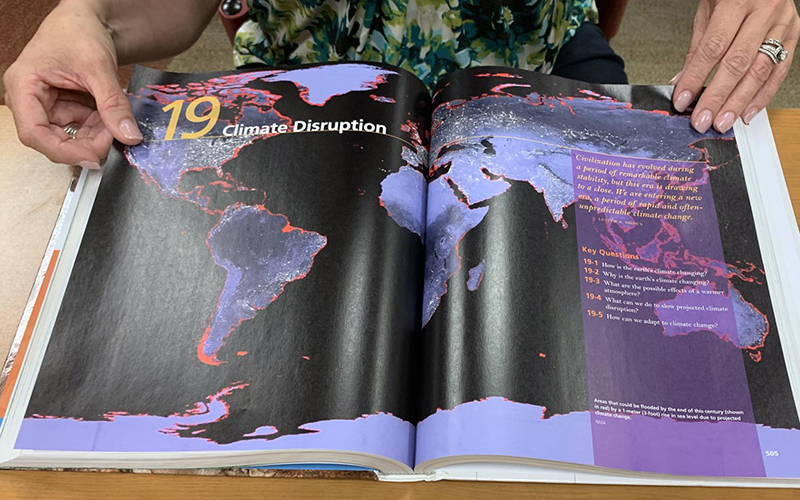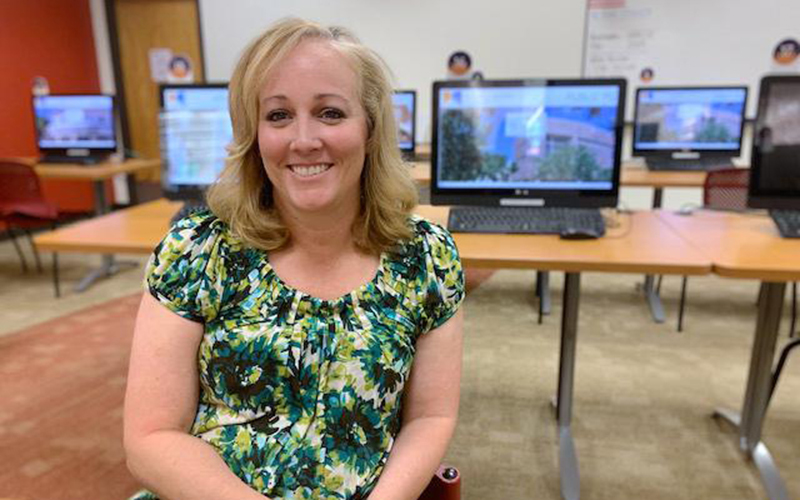
Cathy Culver, who has taught environmental science for nearly two decades, says students are more curious about climate change now. (Photo by Mariana Dale/KJZZ)

“What I would like to see the kids is, whether they agree or disagree with climate change, that they are thinking more critically … and making informed decisions for themselves scientifically,” Cathy Culver says. (Photo by Mariana Dale/KJZZ)
PHOENIX – The majority of parents, no matter where they are on the political spectrum, believe schools should teach about climate change. That’s the finding of a national poll from NPR and Ipsos.
Specifically, 84 percent of parents, 91 percent of Democrats and 66 percent of Republicans responded that schools should teach about how human activity is shaping the climate.
Although most states have classroom standards that at least mention human-caused climate change, the poll found, most teachers aren’t talking about climate change in their classrooms. And fewer than half of parents have discussed the issue with their children.
A separate online poll found teachers are even more likely to support climate change education – 86 percent – although nearly a third worried about complaints from some parents.
For nearly 20 years, Cathy Culver has talked about how the Earth is warming in her earth and environmental science classes in the Chandler Unified School District.
“I address right away from the very beginning, ‘Hey, look, this is a safe environment. I know we’re all going to have different beliefs and feelings on some of the topics we’re going to discuss, and that’s beautiful,'” Culver said.
One of the very first lessons is weather versus climate.
“Weather is talking about the condition of the atmosphere over a short period of time, and climate is talking about the condition of the atmosphere over a long period of time,” said Culver, who teaches at Casteel High School in Queen Creek.
Arizona last year adopted new science standards that require students to learn how natural and human processes shape global climate.
Culver said she routinely modifies her lesson plans to meet students’ interest. Most recently, a discussion about water pollution turned into a series of questions about whether water softeners are illegal. (They’re not banned in Arizona, in case you’re wondering, but Scottsdale and other cities offer rebates to get rid of salt-based softeners.)
“They’ll bring new information to me that I didn’t know because science is constantly evolving and changing over time,” Culver said.
One of the class’s most popular activities is the “ecocolumn.” Students fill plastic 2-liter bottles with water, soil, plants and small animals such as worms and pill bugs and track the ecosystem’s survival over weeks.
Culver also draws lesson ideas from ASU’s Global Institute of Sustainability.
In a few weeks, students will head outside with handheld thermometers and measure the temperatures over different surfaces – from the soccer field to the school parking lot.
“We analyze that data, and we look at the different mediums that are absorbing and reflecting solar radiation,” Culver said.
It’s a way to talk about the heat island effect and how Phoenix’s development can shape the temperature here.
“What I would like to see the kids is, whether they agree or disagree with climate change, that they are thinking more critically … and making informed decisions for themselves scientifically,” Culver said.
The online poll, conducted in March, included 1,007 U.S. adults and 505 teachers, according to NPR.
This story is part of Elemental: Covering Sustainability, a new multimedia collaboration between Cronkite News, Arizona PBS, KJZZ, KPCC, Rocky Mountain PBS and PBS SoCal.
AlertMe